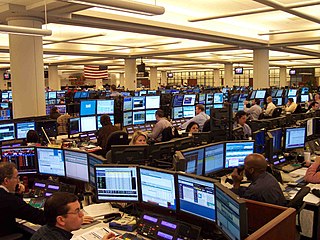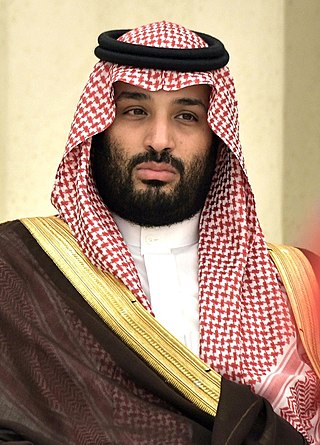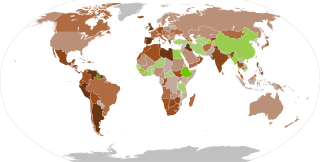| |||||
| Decades: | |||||
|---|---|---|---|---|---|
| See also: | Other events of 2020 History of Saudi Arabia | ||||
The following lists events in the year 2020 in Saudi Arabia .
| |||||
| Decades: | |||||
|---|---|---|---|---|---|
| See also: | Other events of 2020 History of Saudi Arabia | ||||
The following lists events in the year 2020 in Saudi Arabia .

The economy of Saudi Arabia is the largest in the Middle East and the eighteenth largest in the world. A permanent and founding member of OPEC, Saudi Arabia is also a member of the G20 forum as one of the world's largest economies.

Foreign relations of Saudi Arabia are the diplomatic and trade relations between Saudi Arabia and other countries around the world. The foreign policy of Saudi Arabia is focused on co-operation with the oil-exporting Gulf States, the unity of the Arab world, Islamic solidarity, and support for the United Nations. In practice, the main concerns in recent years have been relations with the US, the Saudi Arabian–led intervention in Yemen, the Israeli–Palestinian conflict, Iraq, the perceived threat from the Islamic Republic of Iran, and the effect of oil pricing. Saudi Arabia contributes large amounts of development aid to Muslim countries. From 1986 to 2006, the country donated £49 billion in aid.

The economy of Yemen has significantly weakened since the breakout of the Yemeni Civil War and the humanitarian crisis, which has caused instability, escalating hostilities, and flooding in the region. At the time of unification, South Yemen and North Yemen had vastly different but equally struggling underdeveloped economic systems. Since unification, the economy has been forced to sustain the consequences of Yemen's support for Iraq during the 1990–91 Persian Gulf War: Saudi Arabia expelled almost 1 million Yemeni workers, and both Saudi Arabia and Kuwait significantly reduced economic aid to Yemen. The 1994 civil war further drained Yemen's economy. As a consequence, Yemen has relied heavily on aid from multilateral agencies to sustain its economy for the past 24 years. In return, it has pledged to implement significant economic reforms. In 1997 the International Monetary Fund (IMF) approved two programs to increase Yemen's credit significantly: the enhanced structural adjustment facility and the extended funding facility (EFF). In the ensuing years, Yemen's government attempted to implement recommended reforms: reducing the civil service payroll, eliminating diesel and other subsidies, lowering defense spending, introducing a general sales tax, and privatizing state-run industries. However, limited progress led the IMF to suspend funding between 1999 and 2001.

Saudi Aramco, officially the Saudi Arabian Oil Group or simply Aramco, is a Saudi Arabian public petroleum and natural gas company based in Dhahran. As of 2022, it is one of the largest companies in the world by revenue. Saudi Aramco has both the world's second-largest proven crude oil reserves, at more than 270 billion barrels, and largest daily oil production of all oil-producing companies. It is the single greatest contributor to global carbon emissions of any company in the world since 1965.

Salman bin Abdulaziz Al Saud is King of Saudi Arabia, reigning since 2015. He also served as Prime Minister of Saudi Arabia from 2015 to 2022. The 25th son of Ibn Saud, the founder of Saudi Arabia, he assumed the throne on 23 January 2015. Prior to his accession, he was Crown Prince of Saudi Arabia from 16 June 2012 to 23 January 2015. Salman is the 3rd oldest living head of state and the oldest living monarch besides being the country's first head of state born after the unification of Saudi Arabia.

The economy of the Middle East is very diverse, with national economies ranging from hydrocarbon-exporting rentiers to centralized socialist economies and free-market economies. The region is best known for oil production and export, which significantly impacts the entire region through the wealth it generates and through labor utilization. In recent years, many of the countries in the region have undertaken efforts to diversify their economies.

The price of oil, or the oil price, generally refers to the spot price of a barrel of benchmark crude oil—a reference price for buyers and sellers of crude oil such as West Texas Intermediate (WTI), Brent Crude, Dubai Crude, OPEC Reference Basket, Tapis crude, Bonny Light, Urals oil, Isthmus, and Western Canadian Select (WCS). Oil prices are determined by global supply and demand, rather than any country's domestic production level.

Bilateral relations between Saudi Arabia and the United States began in 1933 when full diplomatic relations were established and became formalized in the 1951 Mutual Defense Assistance Agreement. Despite the differences between the two countries—an Islamic absolute monarchy, and a secular constitutional republic—the two countries have been allies ever since. The core logic underpinning the relationship is that the United States of America (USA) provides military protection of the Kingdom in exchange for a reliable oil supply from the Saudis, pricing of oil in USA dollars, and Saudi support for American foreign policy operations across the world. Ever since the modern relationship began in 1945, the U.S. has been willing to overlook some of the kingdom's more unusual aspects such as Wahhabism, its human rights and alleged state-sponsored terrorism as long as it maintained oil production and supported USA national security policies.

Bilateral relations between Iran and Saudi Arabia have been strained over several geopolitical issues, such as aspirations for regional leadership, oil export policy and relations with the United States and other Western countries. Diplomatic relations were suspended from 1987 to 1990 and for seven years after the execution of Nimr al-Nimr and the 2016 attack on the Saudi diplomatic missions in Iran. However, in March 2023, after discussions brokered by China, Iran and Saudi Arabia agreed to reestablish relations.

Mohammed bin Salman Al Saud, colloquially known by his initials MBS or MbS, is Crown Prince and Prime Minister of Saudi Arabia. He also serves as the chairman of the Council of Economic and Development Affairs and chairman of the Council of Political and Security Affairs. He is considered the de facto ruler of Saudi Arabia, being deemed as such even before his appointment as prime minister in 2022. He served as minister of defense from 2015 to 2022. He is the seventh son of King Salman.
The modern history of Saudi Arabia begins with the declaration of the unification of Saudi Arabia in a single kingdom in 1932. This period of time in Saudi Arabia's history includes the discovery of oil in Saudi Arabia and many invents. It goes on to encompass Saudi Arabia's brief involvement in World War II in 1945. Afterwards, it includes Saudi Arabia's involvement in the Western Bloc and the Cold War. It also includes Saudi Arabia's proxy conflict with Iran, the Arab Spring, and the ongoing Arab Winter.
The following lists events in the year 2019 in Saudi Arabia.

On 14 September 2019, drones were used to attack oil processing facilities at Abqaiq and Khurais (خريص) in eastern Saudi Arabia. The facilities were operated by Saudi Aramco, the country's state-owned oil company. The Houthi movement in Yemen claimed responsibility, tying it to events surrounding the Saudi Arabian–led intervention in the Yemeni Civil War and stating they used ten drones in the attack launched from Yemen, south of the facilities. Saudi Arabian officials said that many more drones and cruise missiles were used for the attack and originated from the north and east, and that they were of Iranian manufacture. The United States and Saudi Arabia have stated that Iran was behind the attack while France, Germany, and the United Kingdom jointly stated Iran bears responsibility for it. Iran has denied any involvement. The situation exacerbated the 2019 Persian Gulf crisis.

Events of 2020 in Yemen.
The COVID-19 pandemic in Saudi Arabia is part of the worldwide pandemic of coronavirus disease 2019 caused by severe acute respiratory syndrome coronavirus 2. The first case in the kingdom was confirmed by the Ministry of Health on 2 March 2020 and in the following months, the kingdom held the highest number of confirmed cases in the Arab states of the Persian Gulf.

On 8 March 2020, Saudi Arabia initiated a price war on oil with Russia, which facilitated a 65% quarterly fall in the price of oil. The price war was triggered by a break-up in dialogue between the Organization of the Petroleum Exporting Countries (OPEC) and Russia over proposed oil-production cuts in the midst of the COVID-19 pandemic. Russia walked out of the agreement, leading to the fall of the OPEC+ alliance.

Economic turmoil associated with the COVID-19 pandemic has had wide-ranging and severe impacts upon financial markets, including stock, bond, and commodity markets. Major events included a described Russia–Saudi Arabia oil price war, which after failing to reach an OPEC+ agreement resulted in a collapse of crude oil prices and a stock market crash in March 2020. The effects upon markets are part of the COVID-19 recession and are among the many economic impacts of the pandemic.

The COVID-19 recession is an ongoing global economic recession caused by the COVID-19 pandemic. The recession began in most countries in February 2020.
Events in the year 2021 in Saudi Arabia.
Events in the year 2022 in Saudi Arabia.